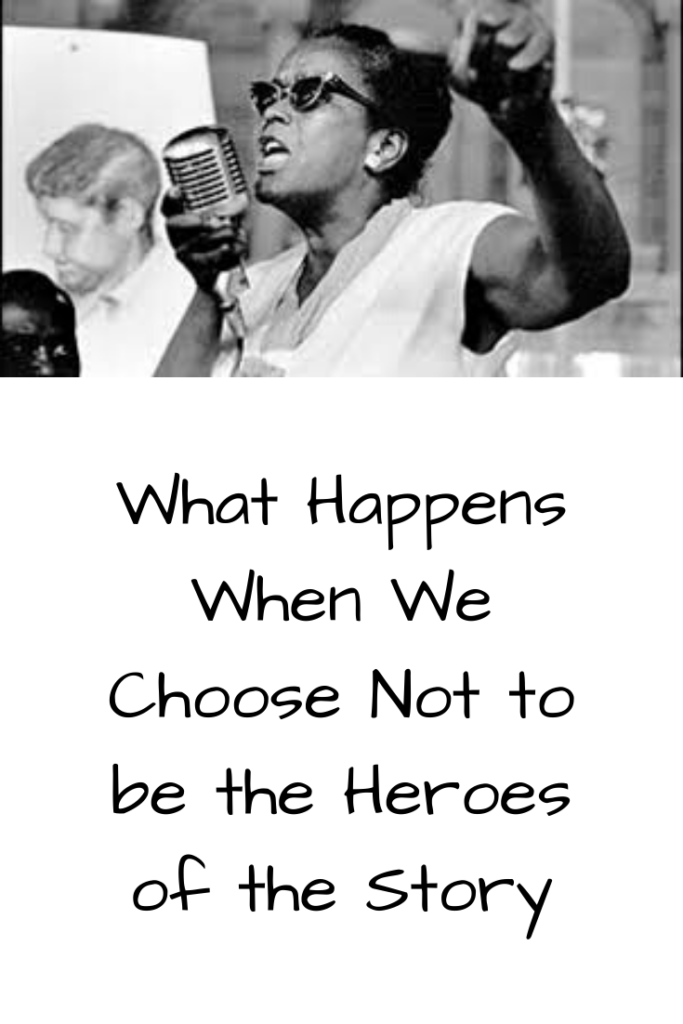
“Heroes. Noble warrior heroes,” says Carol Danvers in the new movie Captain Marvel, referring to the group of aliens she’s part of.
Spoiler alert: that wording is a red flag.
As people, we’re inclined to make ourselves heroes of our own stories. History books glorify the people with the highly visible jobs who make the big speeches. In activism, there’s often a desire to do the flashy stuff, like marches and getting arrested, even when (and sometimes because) it’s risky. Even as parents we want to make ourselves the heroes of our children’s stories, presenting our kids’ accomplishments as our own.
Yet when we frame ourselves as heroes, we make the story all about us. There’s no perspective from other people, even when it’s desperately needed. After all, the hero can do no wrong – even if it means bribing folks to get your kids into college or using money raised for a non-profit for your personal gain.
But I learned the value of another path from one of my favorite Civil Rights activists, Ella Baker. What was revolutionary about her was how she shunned the spotlight. She opposed the idea of charismatic leadership in advocacy and religion, especially the structure of mostly male leaders overseeing female participants. Instead, she embraced participatory democracy, focusing on collective, grassroots action. As part of that, she did all of the “boring,” thankless stuff that needs to be done to bring about social change. She headed up phone banking to encourage people to vote, fundraised, organized volunteers, and brought people together. Her core talent was helping people empower themselves so they could lead themselves. Her approach was truly revolutionary.
Reading about her made me recognize the value of my own work. I’ve never been the face of an organization. I’ve always found people who needed help and chipped in instead of starting my own thing. I’be never had the sexy titles on my resume because I often participate in hippie-dippie, consensus-based groups that don’t have those titles in the first place. So at times, I’ve felt like I’ve been denied glory or even gotten bitter about the lack of recognition. Reading about her helped me embrace the necessary but less visible work of activism.
Recognizing the importance of this unglamorous work has made me a better mom and wife too. While it may seem unrelated, so much of what we do as parents is this inglorious, everyday work. It often has little recognition and a whole lot of exhaustion. While I’ve always known intellectually that time spent with my kids is “worth it,” the necessary tasks of parenting can grind you down, from folding the millionth piece of laundry to sitting in the dark to get your kid to go to sleep. Plus, society does a terrible job of recognizing the value of this work. Caretaking professions are vastly underpaid and being a stay-at-home parent is considered a “gap in your resume” where a “real job” should be. But just as those ordinary tasks set the foundation for social change through the Civil Rights movement, the ordinary tasks in our own families set the foundation for healthy relationships. Recognizing the value of my work in my family as well as that of my husband as a stay-at-home dad has helped me respect what we both contribute to our family. It also helps me better appreciate the many, many people who do care-taking work around us and work so they are supported and fairly compensated too.
As we finish off Women’s History Month, let’s try to remember the women (and non-binary folks, as they are rarely recognized) who made a difference by working in the background. So often, if they are in history books at all – especially the people of color – it’s as a footnote.
The personal and the political never stand alone – each influences each other and how we see our world. The more we can respect everyone’s work – paid or unpaid, male or female, visible or hidden, producing goods or care taking – the more we can fully respect them. And the more we can respect the individually small but collectively huge contributions we bring to the table as well.
For more on the intersection of social justice and parenting, follow We’ll Eat You Up, We Love You So.